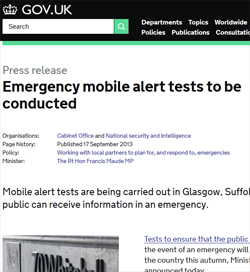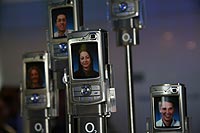The Civil Contingencies Secretariat are working with the mobile industry and local responders to test public emergency alerts via mobile devices, the government announced in a press release issued today 17th September.
But, will the government need to know where you are located in order to send the message, or know your mobile number?
The Government says that in the event of an emergency, it is vital that information is given to the public as quickly as possible so that they can take the necessary action to keep themselves and their families safe. This action might involve evacuation, taking shelter, or simply keeping a watching brief on the situation.
The Civil Contingencies Secretariat are working with the mobile industry and local responders to test public emergency alerts carried out by mobile alerting.
 They also say, that in a world where mobile phone ownership continues to soar (92% of the UK public now own a mobile phone) and where demand for information ‘on the go’ is expected, advancements in technology must be considered when striving for improvements to public emergency alert systems.
They also say, that in a world where mobile phone ownership continues to soar (92% of the UK public now own a mobile phone) and where demand for information ‘on the go’ is expected, advancements in technology must be considered when striving for improvements to public emergency alert systems.
This is why the Civil Contingencies Secretariat (CCS) are working in partnership with the mobile industry and local responders to trial different approaches to mobile alerting that would target members of the public in an area impacted by an emergency, via their mobile device.
The Government says: 'One very important part of this proposed capability is that it would NOT require the government or local responders (e.g. the police or your council) to know individual personal numbers. It would also NOT require people to sign up to receive messages.
Instead, the idea is that if you are in an area where an emergency occurs then you will be sent a location based alert which will convey important protective action for you to take.'
But how is the information gathered to determine locations and numbers in the area of an emergency in order to send out the messages? Isn't this know opening the Pandora's box of true government surveillance of its citizen's on a day to day basis via mobile phone technology?
The Government explained how the system works in its press release:
Three trials will be run this autumn, working with three of the UK’s biggest mobile network operators to test different technical approaches for such a system.
Two different approaches will be tested as part of the trials:
- cell Broadcast service (CBS): the broadcast of a text-type message to all handsets in a defined area
- location-based SMS messaging: all numbers in a specific location receive a traditional SMS message
 ‘Cell broadcast’ is the transmission of a text-type message to a defined geographic area. The mobile phone network is split into ‘cells’ with a mast at the centre, these range in size depending where you are in the country. During cell broadcasting, cells can be selected and a message broadcast to every active handset within it.
‘Cell broadcast’ is the transmission of a text-type message to a defined geographic area. The mobile phone network is split into ‘cells’ with a mast at the centre, these range in size depending where you are in the country. During cell broadcasting, cells can be selected and a message broadcast to every active handset within it.
Cell broadcast operates on a different channel to voice and SMS (texts) and therefore does not suffer from nor contribute to network congestion. Personal data such as telephone numbers or user data are not required as the message is sent to all handsets in the area.
Location based SMS involves the use of a database to develop a list of numbers within a defined area in order to send them an SMS message directly.
But here is the worrying bit as far as personal privacy and security is concerned.
For the system to work using the 'SMS' system, the Government (or the private company, English or American etc running the system) will need access to the database held by mobile phone companies.
Currently the locations of mobile phones are tracked by the database which is owned by the mobile network operator. This will allow handsets to be messaged if the person carrying it is in an area impacted by an emergency. Personal data such as telephone numbers are stored in the database so people would not be required to sign up.
Whilst the Government are saying that at present, there is nothing stopping such personal information being accessed and stored by the Government and its private companies administering and running the system at any time in the future.
The trials will take place in three locations:
- North Yorkshire - 18 September
- Glasgow - 3 October
- Suffolk - 20 November
The trials will be evaluated drawing on information from three different perspectives:
- opinions from the mobile industry on the technical and corporate implications of introducing such a system
- public views and thoughts on alert message content, method of delivery and resulting behaviour
- views from emergency responders including how such a system would enhance their existing arrangements, the resources and training that might be required to manage it and when it could be most effectively used
No decision has been made at this point how this work might evolve in the future.
Once the trials have been conducted, CCS will produce a report in early 2014, detailing the findings of the trials and recommending a way forward for consideration by the government. A copy of this report will also be published on www.GOV.UK
If you have any views on this work you can email the government department responsible for the work: public.alert@cabinet-office.x.gsi.gov.uk or via Twitter @UKResilience using #UKAlertTest.
Source: Cabinet Office


 They also say, that in a world where mobile phone ownership continues to soar (92% of the UK public now own a mobile phone) and where demand for information ‘on the go’ is expected, advancements in technology must be considered when striving for improvements to public emergency alert systems.
They also say, that in a world where mobile phone ownership continues to soar (92% of the UK public now own a mobile phone) and where demand for information ‘on the go’ is expected, advancements in technology must be considered when striving for improvements to public emergency alert systems.  ‘Cell broadcast’ is the transmission of a text-type message to a defined geographic area. The mobile phone network is split into ‘cells’ with a mast at the centre, these range in size depending where you are in the country. During cell broadcasting, cells can be selected and a message broadcast to every active handset within it.
‘Cell broadcast’ is the transmission of a text-type message to a defined geographic area. The mobile phone network is split into ‘cells’ with a mast at the centre, these range in size depending where you are in the country. During cell broadcasting, cells can be selected and a message broadcast to every active handset within it.